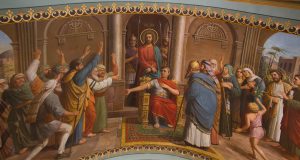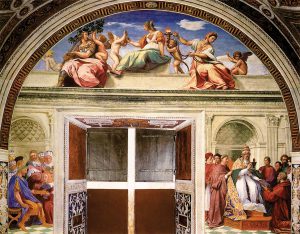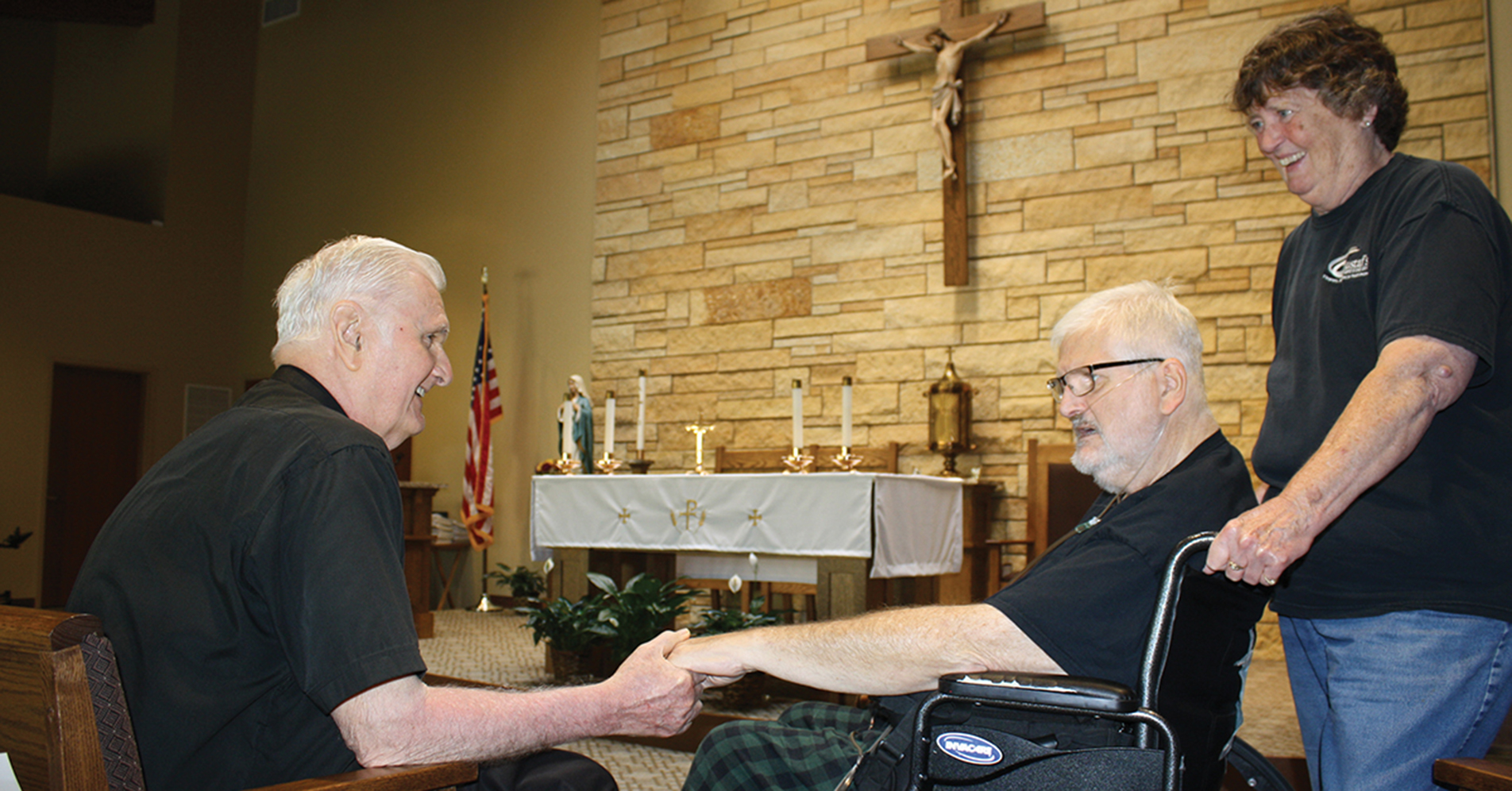
By Renae Kranz
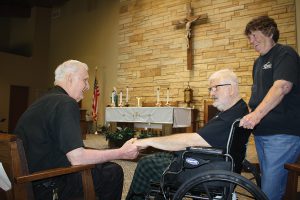
When you see someone you perceive as different from you, maybe a homeless person or someone who is disabled, what pops into your mind?
If we’re honest with ourselves, we probably wouldn’t want anyone to know what we’re thinking. It might go something like this:
That person makes me uncomfortable. I don’t like to be uncomfortable. If I pretend I don’t see them, they’ll probably leave me alone, and I won’t have to deal with them. I’m glad that’s not me.
Sound even a little familiar?
It sounds familiar because many of us have those thoughts. We might not mean to, and we might quickly correct ourselves and choose a different action rather than avoidance. But we’re human. We seek comfort and avoid conflict.
But our faith calls us to a different reaction. Why? Because of a beautiful gift freely given to us by our God—our human dignity.
The Church’s teaching on human dignity
The Catechism of the Catholic Church (CCC) defines human dignity this way:
Of all visible creatures only man is “able to know and love his creator.” He is “the only creature on earth that God has willed for its own sake,” and he alone is called to share, by knowledge and love, in God’s own life. It was for this end that he was created, and this is the fundamental reason for his dignity. (CCC 356)
What greater calling can there be than to know and love our creator? Fido and fluffy can’t do that. Oh, they might love your company and be distressed when you’re gone, but they can’t know the very God who created them. They don’t even know they were created by anything. When you think about it, the differences between humans and all other creation are staggering—that is our human dignity.
The CCC continues with more clarity:
Being in the image of God, the human individual possesses the dignity of a person, who is not just something, but someone. He is capable of self-knowledge, of self-possession and of freely giving himself and entering into communion with other persons. And he is called by grace to a covenant with his Creator, to offer him a response of faith and love that no other creature can give in his stead. (CCC 357)
God’s creative gift applies to everybody, everywhere, in all times. Bishop Paul Swain sees the apostles as perfect examples of the diversity of creation. They came from very different backgrounds, had different personalities, and strengths and weaknesses, yet Jesus chose them all to do his work. And among them was Judas who betrayed Jesus but still had dignity as part of God’s human creation.
Regardless of our perceptions of others, the gift of human dignity permeates every human person.
“Human dignity is a recognition that every person is gifted by God with life,” Bishop Swain says. “And so we’re all…deserving of respect. We should treat each other with dignity and not discriminate against and not look down upon others, recognizing the great diversity among us, that we’re all children of God.”
Where we go wrong
Daryl Thuringer, delegate and director of Parish and School Services for the diocese, tries to sees every person as a special gift from God to the world. He says the Church teaches us to treat others with the same respect we would give God.
Can you imagine what the world would be like if we all followed that Church teaching? But we often veer away from that teaching to a skewed idea of human dignity, causing many to get pushed to the margins.
Thuringer feels that the definition of human dignity we have created in our society is often too fluid. We see dignity in a person as dependent upon who you are, what you’ve done or what situation you’re in. Each person seems to define dignity in their own personal way.
Examples of what Thuringer is referring to abound. A child has human dignity unless they aren’t born yet; at the same time, if a pregnant mother is murdered, the assailant can be charged with double homicide. A homeless person has dignity unless he’s drunk. An ex-con has dignity unless he has too many tattoos. As soon as we’re uncomfortable, dignity goes out the window.
“Say you’re walking down the street, and you run into a homeless person and they ask you for 50 cents. That’s getting too close,” Thuringer says. “That’s making me uncomfortable. So now it’s my human dignity that’s being infringed on. So I no longer see that person and their human dignity, because it infringes on mine. Society says it’s okay for us to shun someone, which in essence strips them of their human dignity, which strips both of us of our human dignity.”
Bishop Swain sees this as a focus on self-centeredness. Rather than seeing our common human nature and dignity, we tend to see our differences and how we stack up against other’s differences. It’s a constant game of comparing.
“This self-centeredness has resulted over the centuries in discrimination, slavery, wars, viewing ourselves as somewhat better than others, or having an exalted view of what’s right and wrong based upon our own self interests,” Bishop Swain says. “Part of it is because of our fallen human nature. Part of it is because I honestly believe Satan takes advantage of those weaknesses in us.”
Why does this dichotomy between what the Church teaches and what we as a society do instead exist in the first place? It all comes down to human freedom.
Our good God gave us a great gift—the free will to choose Him or to turn away. He gave us human freedom so we could express our dignity with our choices. Does that mean we are free to do whatever we want? Not exactly.
Bishop Swain explains that the true definition of freedom is to do what we ought. In other words, to choose the moral way.
“There’s a difference between that type of freedom and the freedom to say, okay, I’m just going to do what serves my own interests,” Bishop Swain says. “The freedom to do what we ought to do is not always clear to us at certain times. That’s one reason why we sin. That’s one reason why the church reminds us often of Christ’s love and mercy.”
Deacon Chet Cordell reminds us it’s important to remember we’re all sinners, but we’re also all loved by God. If we don’t think we sin, we might also think we’re better than someone else.
“To know that God loves you, well that also means God loves him and her,” Deacon Chet says. “That’s a balance of perspective. I think if we keep that in front of our eyes, we’re on the right path.”
Thankfully, our way isn’t God’s way. He wants us to give life to others and help them in their weakness. As Catholics, our opportunities to do just that spring out of our relationship with God through His Son. When that relationship is strong and deep, our human dignity is easy to share with others.
Homeless: pushed to the fringes of society
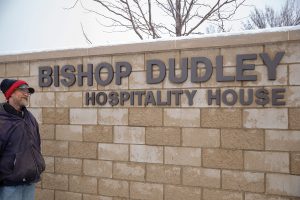 Thuringer, who is also the board president for the Bishop Dudley Hospitality House (BDHH), has seen the difficulties faced by the homeless population. He says even though those who work and volunteer at the BDHH look at them as having dignity, it’s hard for the homeless to see it in themselves.
Thuringer, who is also the board president for the Bishop Dudley Hospitality House (BDHH), has seen the difficulties faced by the homeless population. He says even though those who work and volunteer at the BDHH look at them as having dignity, it’s hard for the homeless to see it in themselves.
“We welcome them and respect their dignity, but they need to regain their own sense of dignity,” Thuringer says. “It doesn’t happen overnight. It doesn’t happen just by us telling them that they are still a child of God and they are still loved.”
While they respect their dignity, BDHH also respects their free will. No one is forced to receive services from the group. They come on their own and stay of their own accord.
“If that’s the way they choose to live [in the streets], we’ll help them if we can, but we also can’t strip them of their free will,” Thuringer explained. “We can advise them. We can encourage them to make other choices. But in the end, that person endowed with free will from God will make their own choice.”
Staff and volunteers work to meet each person where they are. While guests stay, they are asked to help take care of their temporary home. They might be asked to wash or fold sheets, wipe down beds, clean bathrooms or wash the floor. Performing these duties to take care of the facility helps them feel their dignity again.
“To me that gives them part of that dignity and work ethic and helps them build up their dignity and their pride,” Thuringer says. “Some people have to be able to do a few things before they can look in the mirror and feel proud about what they’ve done. They feel stripped of their dignity, so when they come to us, we have to reassure them that they still have it, that they’re still a dignified, loving person.”
Helping take care of the facility gives them a chance to say, “I don’t just stay here, I help with the place.” It’s an important step among many to help them on the road to self-sufficiency. BDHH offers resources to help with housing and job opportunities and addiction care if the person is open to it.
“One of our main jobs is to instill hope,” Thuringer says. “Because you’ve kind of lost some hope when you’re homeless.”
Prisoners face similar challenges
Prison is a scary and often hopeless place. Here people become only a last name, a faceless being with no one to love them and no one to show them mercy. But God doesn’t see them that way.
To God, a prisoner is just one of his children who is in trouble and needs Him more than most right now. He offers love and mercy. Many times, those things are delivered through deacons, priests and other volunteers in prison ministry.
Deacon Chet ministers to prisoners at the South Dakota State Penitentiary in Sioux Falls. He sees his job as an opportunity to walk with them during a time of crisis.
“It’s a battleground hospital site,” Deacon Chet says. “I know the penitentiary isn’t a parish, but in my heart that’s my parish. I can talk to them. I can pray with them. I can listen to them.”
It’s his job to help them feel their human dignity again. One way he does that is by using their first names when talking to them to show them respect.
“If you’re going to give up on somebody else’s humanity, aren’t you giving up on part of you? Because what part of your humanity is different than this one? That’s what salvation and grace are all about.”
Prison is an easy place to lose hope and a sense of dignity. After being judged by the courts and often their families and friends, inmates don’t see a light at the end of the tunnel. They lack a community and good influences to help them find a better path.
“There’s this preconceived notion that because they’re tattooed up and because they have a big “F” felony behind their name, they’re not worth dealing with,” Deacon Chet says. “Because they’re losers they’re never gonna change. But they can change and they do.”
Recidivism rates in South Dakota have risen over the years. Doing things to help inmates find their God-given dignity and hope again are key. Pastoral care provided by chaplains helps while they’re on the inside. And Deacon Chet has seen inmates succeed on the outside when they have the right support and a faith community. But we have to temper our initial expectations.
“A lot of these guys aren’t going to come to Sunday Mass,” Deacon Chet says. “If that’s what your expectation is, well then your ministry isn’t going to go too far because not everybody has progressed that far.”
He says we can do simple things like ask if they got enough to eat today or if they need help finding a job. Talk to them like they have the same dignity we do. They need to know someone cares about them. As Deacon Chet says, “That’s what true Christian community is supposed to do.”
Deacon Chet has seen great examples of prisoners taking care of each other, letting their human dignity show through without even knowing it themselves.
“You’ll see sometimes some of the older guys who are sick and they’ll have a younger guy pushing them around in their wheelchair. You see they’re developing this bond, they’re forming a little community,” Deacon Chet says. “That’s where the Lord is. The Lord is just as much in prison as he is anywhere else. It’s beautiful to see.”
Human dignity makes no room for racism
Our country is without question a racially diverse place. South Dakota, while not as diverse, is experiencing the integration of more races of people than in the past. It’s a good thing to see, and we should all embrace the new faces.
Our past wasn’t always so pretty though, and at times it spills into today. The Native Americans who were here when our state was settled and the generations of their ancestors since have had a tough go of it. This has been mostly due to some who thought a person’s color somehow contributed to their human dignity. Rather than try to live in peace, they were overrun and pushed aside.
Today, Deacon Chet, who serves as director of diocesan outreach to Native Americans, still sees Native Americans in our state struggling with the dominant society. As a communal-oriented culture, they feel secure in their local communities and tend to avoid venturing out much. When they do, Deacon Chet says the walls go up.
“They (outsiders) don’t realize the hardship that’s generational in so many cases,” Deacon Chet says.
“Maybe their great grandfather was hurt by a white settler or maybe through the boarding school. Then the guard’s up, and we’re not open to an exchange of ideas because they all get shot down.”
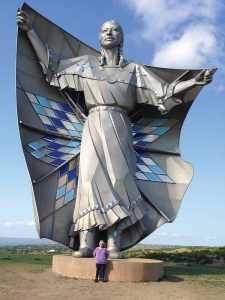
Deacon Chet’s wife Colleen is Native American, so he has seen how she and their children are treated by some people. Things are changing for the better, but there is still much work to do. And it starts with the youth.
Colleen has seen native kids riding with white kids in cars after school. She noted to her husband that would never have happened when she was young. It’s been good to see.
“If we just realize that we’re all part of this family,” Deacon Chet says. “It’s not just the Jewish people who are God’s chosen people. We’re part of that heritage now. And that includes everybody.”
By remembering that all people, no matter their race, are part of the beautiful dignity God gave us, we can embrace our differences and welcome each other into this big family of God.
Elderly still have value
Those who have grown old are sometimes overlooked because they aren’t out in the world making a lot of noise. They are more often alone or pushed to the side because we don’t think they have much to offer.
Father Ed Anderson provides pastoral care at Avera Prince of Peace Retirement Community in Sioux Falls. He has seen the wisdom and life experiences of the people he serves and knows their experiences are valuable to others.
“We need to look at older people, not ignore them, but look at them with respect,” Father Anderson says. “Give them the dignity they deserve. It would surprise many of us that we can learn a lot from older people who perhaps don’t even talk that much.
“It’s not only what they can offer to us, but what we can offer to them. We can offer them the dignity they deserve and the attention they deserve. It can be a very positive relationship,” he says.
Recently, the elderly are in increasing danger because of euthanasia laws that have been passed in several states in our country. Some think they become a burden on others and that it would be better if they weren’t around. Father Anderson says the elderly have value, whether healthy or days from meeting their creator.
“I think taking care of people who are sick or who appear to be in pain or don’t appear to contribute anything seems to be more of a burden on ourselves than it is a burden on them,” Father Anderson says. “The Church looks at life as being a precious commodity and only God, or the circumstances, can take a life.”
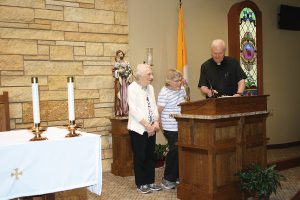
Some who argue for euthanasia say people shouldn’t have to suffer or that suffering is only bad. However, God can use suffering for the good of others. Remember how your mother or grandmother used to tell you to “offer it up”? This action can have great power in people’s lives.
“Jesus did this when he was on the cross. I look at suffering not as something to necessarily be endured, although that’s what we do,” Father Anderson says. “But I look at it as something that we can use to bring goodness to the world through what we experience and goodness to other people.”
That is the gift of human dignity—using what happens to us for the good of others. Jesus did this as an example for us to follow and a way to get closer to Him. Young or old, we can join our sufferings to His for the good of others.
Father Anderson says we can be a light to elderly who may be lonely, especially those still at home. Check with your parish to see if there are older people who need visitors. We fear being alone as we get older. Let’s try not to leave others alone as they grow old as well.
“Our older people are often times our prayer warriors,” Father Anderson says. “As we’re getting older, we still have the ability to bring the presence of God to other people and to improve the lives of other people around us. That doesn’t go away as a person gets older.”
Disabled have lots to offer
People with disabilities face some of the same challenges as elderly people. We sometimes see them as having less to offer, but that couldn’t be further from the truth. Their gifts may be different or at different levels than those of others. They just want an opportunity to share their gifts and their dignity with others.
Jodi Reel, whose son Jack has autism, sees how people with disabilities live in the present and are fully open to give and receive love without reservation. She sees their pure joy and acceptance of things as they are.
“I’ve noticed that people who have disabilities seem to recognize God, hear God, and respond far more quickly than we do,” Reel says. “Jack has an ability to bring everything to its essential, and he, by far, has the most knowledge of God in our household, by sheer gift of being able to accept things as they are.”
Reel also sees the fear in other people because they don’t know how to act or if they have what it takes to interact with people with disabilities. They’re afraid they’ll do it wrong. But you can’t do love wrong. You can’t mess up when you respect dignity.
“They cannot see Jack’s dignity because they can’t see him,” Reel says. “However, there are people who have come into our lives who do see Jack as another soul, who know that everyone’s needs are the same, regardless of ability. That need is to love and to be loved, to know and to be known, to be needed and heard. Those people have been a tremendous blessing in our lives.”
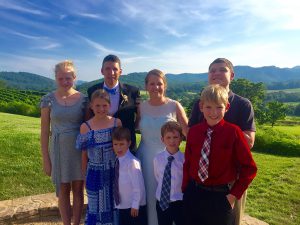
The Church can also be a blessing. For many years, religious education has been difficult for families with children who have disabilities. But it’s something the Church has been working on. Jack has recently started volunteering at their parish, St. Lambert in Sioux Falls. And through the Special Needs Ministry, the diocese has begun implementing tools and education for parishes to bring those with disabilities into parish life.
Even the Totus Tuus group got involved this summer. On their only day off from traveling and working with kids around the diocese, they offered a one-day camp for kids with disabilities. And everyone loved it.
“It was an amazing day,” says Thuringer. “The kids loved it because they learned so much. And the parents felt included because we all want our children to have those opportunities.”
Reel sees what some might consider a burden to be a blessing in her life. She understands that she has little control over life. So she surrenders control to God instead, which releases her of fear and worry.
“That surrender can be a beautiful thing,” Reel says. “People with disabilities show us how to be able to love and receive love, to find joy in the simple things, to rely on people with humility and trust. They teach us patience towards others, how to let go of our expectations, go with the flow, and embrace the reality before us. People don’t have a less life because they have a different life. Jack has taught me all of that. He is a gift.”
How should we respond?
When others need us, what do we do? Do we reach out or turn away?
When we reach out, we make a choice that builds human dignity. When we turn away, we strip away our own dignity and those we turn away from. Will we take advantage of the opportunities around us?
Bishop Swain says how we love our neighbor reflects on how we love our Lord.
“It’s important to have a personal relationship with Jesus Christ to kind of center us,” Bishop Swain says. “We have to recognize differences and diversity are not bad things. God created us. We’re all God’s children in all of our diversity, and that can guide how we relate to one another, even though it’s hard sometimes.”
Though difficult, our calling as Catholics points toward honoring the dignity of everyone around us. Reel says those who challenge us are gifts because they give us the opportunity to give of ourselves, to be gifts in return. Everyone has something to offer and a need to be loved.
“Because God created and loves them, the best we can offer God is to love them as well. All we have to offer is ourselves, which is a gift, but this is something people have a hard time accepting.” Reel says. “Often, if we can’t offer material things, healing, or other tangible gifts, we can choose to ignore the least among us, believing that we have nothing to give.
“But when we have the humility to accept that all we have is ourselves, and that is enough, then beautiful things can happen.”

